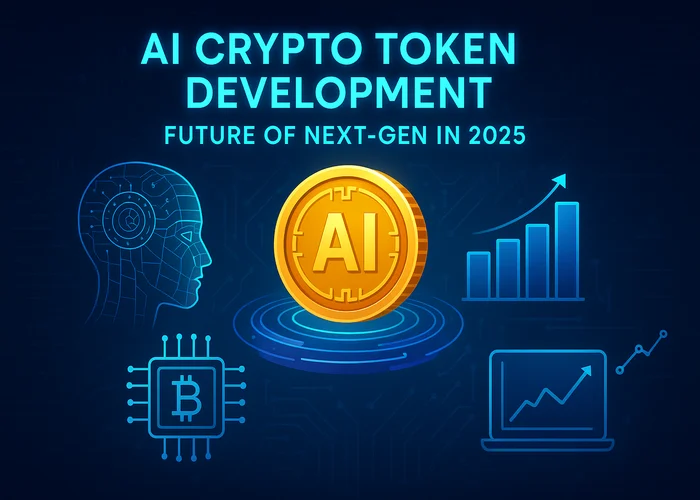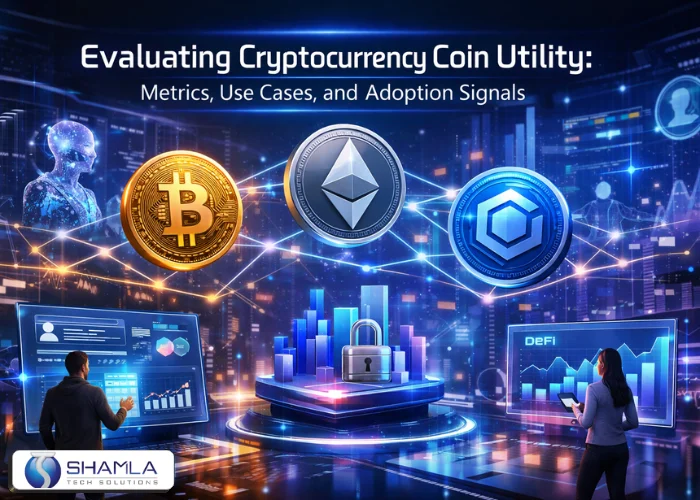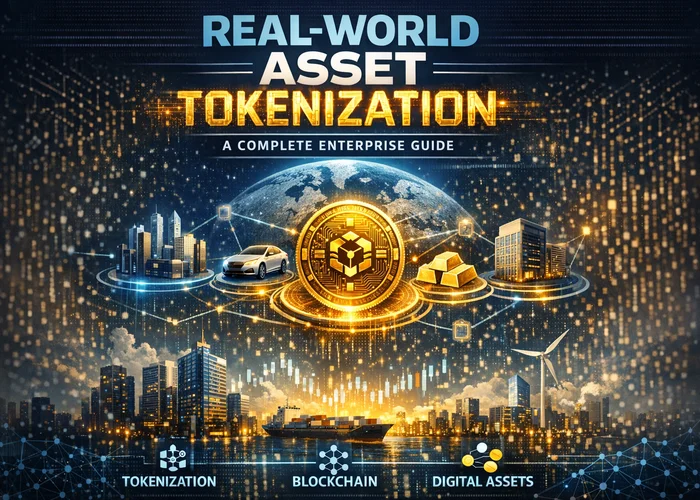The convergence of artificial intelligence and blockchain technology has reached a pivotal moment in 2025, creating unprecedented opportunities for innovation in the cryptocurrency space. AI crypto token development has emerged as the most transformative trend in the digital asset ecosystem, fundamentally reshaping how we conceptualize, create, and interact with digital currencies. This revolutionary fusion represents more than just technological advancement; it embodies a paradigm shift toward intelligent, adaptive, and autonomous financial systems.
As we navigate the complexities of an increasingly digital world, the demand for next-gen crypto tokens that can process information, make decisions, and evolve autonomously has skyrocketed. Traditional cryptocurrencies, while groundbreaking in their own right, lack the sophisticated intelligence required to meet the evolving needs of modern financial applications. This gap has created a fertile ground for AI crypto tokens that combine the security and decentralization of blockchain with the cognitive capabilities of artificial intelligence.
The landscape of crypto token development has evolved dramatically, with blockchain AI tokens leading the charge toward a more intelligent and efficient digital economy. These tokens are not merely digital representations of value; they are sophisticated entities capable of learning, adapting, and optimizing their performance based on market conditions, user behavior, and environmental factors. This intelligence enables them to provide enhanced utility, improved security, and superior user experiences compared to their traditional counterparts.
AI Integration in Blockchain Technology
Early explorations with blockchain protocols and machine learning algorithms led to AI crypto token creation. Starting with AI for blockchain optimization and security, these efforts were basic. But when both technologies progressed, developers saw the possibility for deeper integration and Create Your First Cryptocurrency tokens with AI as a fundamental function rather than a supplementary one.
Several milestones have shaped AI blockchain projects today. Artificial intelligence was employed for transaction verification and fraud detection, employing machine learning algorithms to discover blockchain network irregularities. These early applications showed how AI could improve blockchain security and efficiency, enabling more advanced integrations.
Developers explored embedding natural language processing and deep learning into token smart contracts as technology advanced. Tokens that processed and responded to real-world data, made autonomous decisions based on predefined criteria, and learned from users and market conditions were created. AI tokenization platforms can turn almost any asset or idea into an intelligent digital token.
AI crypto coins today are far more advanced. These coins can automatically predict price fluctuations, refine trading tactics, and find new investment possibilities. Their powerful machine learning algorithms increase their performance over time, making them more valuable and effective.
Technical Architecture of AI-Powered Crypto Tokens
The technical underpinning of AI crypto token production requires advanced blockchain and AI knowledge. AI-powered tokens use advanced machine learning models to handle massive quantities of data and make smart decisions in real time, unlike smart contract tokens.
Initial architecture usually starts with a mixed on-chain/off-chain infrastructure. The blockchain layer handles transaction processing, token transfers, and immutable record-keeping, while AI computations are frequently done off-chain due to computing intensity and expense. This hybrid solution gives the token blockchain security and transparency while keeping processing capacity for advanced AI functions.
AI token functionality relies on smart contracts that integrate with AI models and external data sources. These contracts use oracle systems to send real-world data to AI algorithms, allowing tokens to react to market conditions, economic indicators, and other things. Governance features in smart contracts allow AI systems to make independent decisions within established limitations.
One of the hardest parts of AI token creation is machine learning model integration. Developers must carefully choose and optimize models that run efficiently in blockchain networks and provide meaningful intelligence. Ensemble learning methods combine several models for accuracy, federated learning systems safeguard user privacy while enabling collective intelligence, and reinforcement learning algorithms increase token performance.
Data Management Systems are essential to AI token architecture since these tokens need massive amounts of high-quality data. This comprises historical market data, real-time price feeds, social sentiment analysis, macroeconomic indicators, and user activity. Data integrity, privacy, and blockchain decentralization while supplying AI systems with information are the challenges.
For crypto token solutions consensus mechanisms, blockchain consensus algorithms must be modified to handle AI processing. Some projects use consensus techniques to award nodes for computational resources used in AI model training and inference, incentivizing network users to promote AI capabilities.
Key Features and Capabilities of AI Crypto Tokens
Create Your Own Cryptocurrency Token have many innovative capabilities that set them apart from regular digital assets. These cutting-edge blockchain and AI integration capabilities provide users unprecedented functionality and value.
- Perhaps AI token technology’s biggest achievement is autonomous decision making. These coins can evaluate market conditions, risk considerations, and trade or invest without human interaction. This is crucial in turbulent cryptocurrency markets where quick responses can equal profit or loss. AI algorithms process data and execute deals faster than human traders, discovering and seizing opportunities that manual traders miss.
- AI tokens can accurately predict market trends, price changes, and user behavior using predictive analytics. These tokens can help users make informed decisions by assessing historical data, current market situations, and external elements like news sentiment and macroeconomic indices. AI DeFi coins that maximize yield farming, liquidity, and risk management benefit from this predictive power.
- AI tokens use adaptive learning to improve depending on fresh data and experiences. AI tokens can learn and improve over time, unlike static smart contracts. Learning makes tokens more effective and useful as they gain data and experience.
- Natural Language Processing makes some AI tokens more user-friendly by understanding and responding to human language. These tokens allow users to ask market queries or request particular actions using plain English commands without sophisticated technological interfaces. This makes general adoption of complex bitcoin features much easier.
- AI tokens can examine and integrate data from multiple sources using Multi-Modal Data Processing. This includes price feeds, trading volumes, news articles, social media posts, and multimedia assets like photographs and videos. This extensive data processing improves analysis and decision-making.
- Risk Assessment and Management features detect and evaluate risks to protect users and maximize token performance. AI systems can automatically detect dangers, analyze portfolio exposure, and take precautions. This incorporates market-adaptive exposure restrictions, portfolio rebalancing, and dynamic stop-loss mechanisms.
AI Token Development Methods
AI crypto token development company involves a methodical, strategic, and technical approach. AI tokens require machine learning, data science, and blockchain architectural knowledge, unlike ordinary crypto tokens.
- Planning and conceptualization begin with outlining the token’s AI capabilities and how they will benefit users. This phase includes detailed market research to find opportunities, competitive analysis to understand existing solutions, and technical feasibility studies to ensure suggested features can be implemented. Developers must evaluate the token’s economic model, governance, and sustainability.
- Architecture Design requires precise technical specifications for the token’s blockchain and AI. This involves choosing blockchain platforms, smart contract architecture, machine learning frameworks, and data integration techniques. The design must integrate AI and blockchain components while balancing performance, security, scalability, and cost.
- Build Your Own Cryptocurrency Token is crucial for designing, training, and optimizing machine learning algorithms for the use case. This process includes data collection, preprocessing, feature engineering, model selection and training, validation, testing, and performance optimization. The models must be efficient within blockchain networks and provide relevant intelligence.
- Smart Contract implementation requires writing blockchain logic for token behavior and AI integration. This includes constructing secure and efficient smart contracts, oracle systems for external data feeds, governance structures for AI decision-making, and attack vector protection procedures.
- Testing and validation must evaluate AI and blockchain components independently and together. Unit testing of individual components, integration testing to ensure seamless operation, performance testing under various load situations, security audits to discover vulnerabilities, and user acceptability testing to check end-user functioning are included.
- Deployment and Launch a crypto token entail planned testnet deployment, limited beta releases, and progressive scaling to full production. To succeed, AI token launches must address market timing, regulatory compliance, security, and user education.
Applications and Use Cases in 2025
As AI crypto tokens evolve, new use cases emerge in almost every industry of the digital economy in 2025. Artificial intelligence and blockchain technologies can alter these applications.
- Decentralized Finance (DeFi) applications are a promising field for AI DeFi tokens. These tokens can optimize yield farming strategies by automatically identifying and reallocating funds to the most profitable opportunities, manage liquidity pools with intelligent pricing algorithms to reduce impermanent loss, and protect users from market volatility with automated risk management. AI-powered lending platforms can better assess creditworthiness and offer personalized loan conditions based on data analysis.
- AI-integrated tokens can examine massive quantities of data to improve prediction market probabilities. These systems can make complex predictions based on news sentiment, social media debates, historical trends, and expert opinions for decentralized betting and forecasting platforms.
- Asset management apps use AI tokens to develop intelligent investment portfolios that rebalance based on market circumstances, risk tolerance, and goals. These systems can handle complicated multi-asset portfolios, apply sophisticated hedging methods, and provide individualized investing recommendations based on user profiles and goals.
- Supply Chain Management uses AI tokens to track and verify products, optimize logistics, and assess quality in real time. These tokens can verify supply chain integrity and efficiency using sensor data, transaction histories, and external factors.
- Gaming and virtual worlds integrate AI tokens as intelligent NPCs, dynamic game economics that respond to player behavior, and personalized content generating algorithms to offer unique user experiences. These applications show how AI tokens may improve user engagement and digital immersion.
- Healthcare Applications use AI tokens for safe data storage, tailored therapy, and clinical research coordination. These systems analyze patient data privately, coordinate healthcare professionals, and allow medical research through decentralized data sharing.
Professional Development Services' Role
The complexity of AI cryptocurrency token development has increased demand for professional token development services that mix AI, blockchain, and financial market experience. These professional services help enterprises without internal knowledge use AI token technology.
- Leading Crypto Token Development Companies offer full project management from concept to implementation and maintenance. Market analysis, strategy formulation, technical architecture design, AI model development and training, smart contract implementation, security audits and testing, regulatory compliance consultancy, and continuous support and maintenance are included.
- AI Integration services specialize in adding machine learning to blockchain applications or producing AI-powered currencies. These services generally require unique solution creation to meet client needs and use cases and demand deep domain understanding.
- AI token creation is complicated, but Consulting and Advisory Services may aid with strategic advice, technological experience, and market insights. These services are useful for companies researching AI token opportunities but lacking technical and market knowledge.
- Professional development services help clients establish internal capabilities and comprehend AI token implementation’s technical and business consequences through training and education. Long-term success and AI token technology use depend on knowledge transmission.
Market Trends and Future Outlook
The market for AI crypto tokens is experiencing unprecedented growth in 2025, driven by increasing recognition of the technology’s potential and growing demand for intelligent financial solutions. Several key trends are shaping the development and adoption of these technologies.
Institutional Adoption is accelerating as traditional financial institutions recognize the potential of AI tokens to enhance their operations and service offerings. Major banks, investment firms, and insurance companies are exploring AI token applications for portfolio management, risk assessment, fraud detection, and customer service automation.
Regulatory Clarity is improving as governments and regulatory bodies develop frameworks for AI token governance and oversight. This increased clarity is encouraging more organizations to explore AI token development and deployment, leading to accelerated market growth and innovation.
Technical Standardization efforts are underway to establish common protocols and standards for AI token development and interoperability. These standards will facilitate integration between different AI token systems and promote broader adoption across the industry.
Cross-Chain Integration is becoming increasingly important as AI tokens need to operate across multiple blockchain networks to maximize their utility and reach. New protocols and technologies are being developed to enable seamless AI token operation across different blockchain platforms.
Edge Computing Integration is emerging as a solution to the computational challenges of running AI algorithms on blockchain networks. By leveraging edge computing resources, AI tokens can perform more sophisticated analysis while maintaining the security and decentralization benefits of blockchain technology.
Challenges and Solutions in AI Token Development
Despite the significant potential of AI crypto token development, several challenges must be addressed to achieve widespread adoption and success. Understanding these challenges and their solutions is crucial for organizations considering AI token development.
Computational Complexity represents one of the primary challenges in AI token development. AI algorithms, particularly deep learning models, require significant computational resources that can be expensive and slow on traditional blockchain networks. Solutions include hybrid architectures that perform AI computations off-chain while maintaining blockchain integration, specialized blockchain platforms optimized for AI workloads, and layer-2 solutions that provide additional computational capacity.
Data Privacy and Security concerns arise from the need to protect sensitive information while enabling AI systems to access and analyze data. Solutions include federated learning approaches that enable collective intelligence without sharing raw data, advanced encryption techniques that protect data during processing, zero-knowledge proof systems that verify computations without revealing underlying data, and differential privacy methods that add noise to data to protect individual privacy.
Scalability Issues emerge as AI tokens need to handle increasing numbers of users and transactions while maintaining performance. Solutions include sharding techniques that distribute computational load across multiple nodes, optimization algorithms that improve AI model efficiency, caching mechanisms that reduce redundant computations, and parallel processing architectures that enable concurrent AI operations.
Regulatory Compliance challenges arise from the complex legal landscape surrounding both AI and cryptocurrency technologies. Solutions include working closely with regulatory bodies to ensure compliance, implementing robust audit trails and transparency mechanisms, developing privacy-preserving technologies that meet regulatory requirements, and creating governance frameworks that address regulatory concerns.
Integration Complexity presents challenges when incorporating AI capabilities into existing blockchain systems or creating interoperability between different platforms. Solutions include standardized APIs and protocols for AI-blockchain integration, modular architecture designs that facilitate component integration, comprehensive testing frameworks that validate system integration, and documentation and training resources that support implementation.
Investment and Economic Implications
The emergence of AI crypto tokens is creating new investment opportunities and reshaping economic models within the cryptocurrency ecosystem. Understanding these implications is crucial for investors, developers, and organizations considering involvement in this space.
Token Economics for AI-powered cryptocurrencies often differ significantly from traditional token models. AI tokens may generate value through their intelligence capabilities, creating new revenue streams from data analysis, prediction services, and automated optimization. This value generation can support token prices and provide sustainable economic incentives for network participants.
Investment Strategies for AI tokens require new approaches that consider both traditional cryptocurrency factors and AI-specific metrics such as model accuracy, data quality, learning efficiency, and intelligence capability improvements. Investors must evaluate the technical merit of AI implementations alongside traditional tokenomics and market factors.
Market Valuation methods for AI tokens are still evolving, with new metrics being developed to assess the value of intelligence capabilities and learning potential. These valuations must consider factors such as the quality and quantity of training data, the sophistication of AI models, the uniqueness of intelligence capabilities, and the potential for continuous improvement.
Economic Disruption potential exists across multiple industries as AI tokens enable new business models and more efficient operations. This disruption can create significant value for early adopters while challenging existing business models and market structures.
Conclusion
AI crypto token development represents a transformative force that is reshaping the cryptocurrency landscape and creating unprecedented opportunities for innovation and value creation. As we advance through 2025, the convergence of artificial intelligence and blockchain technology continues to unlock new possibilities that were previously unimaginable.
The future of next-gen crypto tokens lies in their ability to provide intelligent, adaptive, and autonomous functionality that enhances user experiences and creates new forms of value. These tokens are not merely digital assets; they are sophisticated entities capable of learning, reasoning, and evolving to meet the changing needs of users and markets.
Are you looking for an effective team to develop your first AI crypto token? We are here to help you. Connect with us today.








